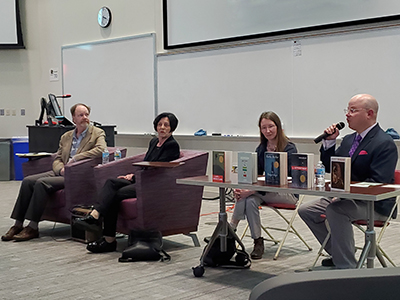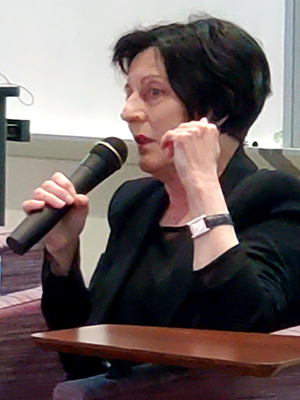Nobel Prize winner speaks of the power of truth in the shadow of a dictatorship

Written by Tori Levy, CAS communications intern

Left to right: translator Phillip Boehm, author Herta Müller, professor of German Nicole Thesz, Walter E. Havighurst Professor of History Stephen Norris
On April 23, the Havighurst Center for Russian and Post-Soviet Studies welcomed 2009 Nobel Prize winner Herta Müller for its annual lecture event. Müller's literature, described as depicting an individual's vulnerability under oppression and persecution, is rooted in her experiences in Romania as a German-speaking ethnic minority.
Müller discussed her works with the help of her translator, Phillip Boehm, an American playwright and theater director. Walter E. Havighurst Professor of History Stephen Norris facilitated the event, along with professor of German Nicole Thesz.
As a German minority, Müller experienced isolation and terror under the Romanian communist regime. Her work of fiction focuses on the individual and explores how they become afraid and alienated under a dictatorship. Her writing also provides various truths, particularly those about the communist past.
"I wouldn't write if I didn't believe that in some way I could access truth," she said.
The Complexity of Truth

Herta Müller
Continuing her discussion of the concept of truth, Müller talked about the dictatorship that she grew up in, which is an essential facet of writing. At the same time, she referred to the concept of invented truths.
"Truth is a complex matter," she said. "While you are experiencing life and transmitting life into words, that means that you're transposing life into a new media. However, that doesn't mean that you're falsifying the truth."
She added that it's impossible to express truth sufficiently without resorting to literature. "It's up to writers of nonfiction to work over the tragedies, and fiction is how we gain access to those feelings," she said.
Müller admitted that she is lucky because she survived the dictatorship and its aftermath. Her survival and ability to write about it speaks to the power of truth because those in power falsify their crimes and their offenses. Even after the dictatorship is gone, she explained, the falsification continues and stays as an open wound.
"In Romania, the repression of German minorities was only happening because all the people, in general, were being repressed," Müller said. She said that there was fear among all people every day — fear sparked from the knowledge that people could be criminalized at any moment.
The View of the Translator
As Müller's preferred translator, Boehm said every book is different.
"I tend to think in terms of putting my ear to the book and listening until I can hear the voices of the original," he said. "There is an electricity that derives from Müller's images and words juxtaposed in ways that I didn't necessarily foresee."
Speaking of the role of language in the context of truth and falsification, he said that dictatorships not only falsify history, but also language. To escape the falsification of language requires a certain uprooting of language.
"The power of these books derives from that uprooted language and trying to capture that," Boehm said.
He added that Müller's literature exposes a dictatorship and highlights the concept of democracy. Democracy is never complete, so it's something that keeps changing — while dictatorships are cemented and fixed in place.
"Dictatorships are not based on the individual but the collective," he said. "The repression of the individual in a dictatorship is when there is a collective, and the individuals are seen as the enemy of the collective."
Müller added that her emphasis is on the importance of the individual in a democracy.
"Individuals are what make up an institution, and the power of a situation will be determined how the individual plays out their humanity," she said.
The Havighurst Center has sponsored a year-long series of events related to the concepts of truth and power that culminated with this event. The annual Havighurst Lecture was founded by a generous endowment by the late English professor Walter Havighurst, whose gift allowed Miami to create a center devoted to the study of Russia, Eastern Europe, and Eurasia.
"Müller's insights about how dictatorships create their own 'truths' and the necessity of combating them through other words provided a fitting, albeit sobering, conclusion to our series," Norris said.

